Nehemiah 1 meaning explained in AI Summary
Nehemiah, cupbearer to King Artaxerxes in Susa, receives distressing news from his homeland, Judah. His brother Hanani and other men arrive from Jerusalem, and Nehemiah inquires about the welfare of the Jewish remnant who survived the exile.
The news is grim. They report that the returned exiles are in great distress and shame. The walls of Jerusalem are still broken down, leaving the city vulnerable, and its gates have been destroyed by fire. This news deeply troubles Nehemiah.
Overwhelmed with grief, Nehemiah weeps, mourns, fasts, and prays to God for days. He confesses the sins of his people, acknowledging their disobedience to God's Law, which led to their exile. He reminds God of His promise to restore them if they repent and return to Him.
Nehemiah's prayer is a heartfelt plea for God's mercy and favor. He asks for success in his yet-to-be-revealed plan to help his people and for the king's favor in this endeavor.
Key Themes:
- The Power of Prayer: Nehemiah's immediate response to bad news is to turn to God in prayer and fasting.
- Confession and Repentance: Nehemiah acknowledges the sins of his people and their need for God's forgiveness.
- God's Faithfulness: Nehemiah appeals to God's promises and His character of mercy and faithfulness.
- A Heart for Jerusalem: Nehemiah's deep concern for his people and the holy city is evident in his grief and his prayer.
This chapter sets the stage for Nehemiah's mission to rebuild the walls of Jerusalem, a symbol of the city's restoration and the people's return to God.
Nehemiah 1 bible study ai commentary
Nehemiah’s personal distress over the condition of Jerusalem translates into a model of intercessory prayer. Hearing of the city's physical ruin and the people's disgrace, he turns to God not with impulsive demands but with a structured prayer founded on God's character and covenant promises. This chapter reveals the heart of a leader whose public action is birthed from private piety, mourning, and deep theological conviction, setting the stage for one of the Bible's great narratives of restoration and leadership.
Nehemiah 1 context
Nehemiah’s account begins around 445/444 B.C. in Susa, the winter capital of the Persian Empire under King Artaxerxes I. Nearly a century had passed since Zerubbabel led the first return of Jewish exiles to rebuild the Temple (completed in 516 B.C.), and about 13 years since Ezra led a return to teach the Law of God. Despite the restored Temple, the city of Jerusalem itself remained vulnerable. The absence of fortified walls was a source of constant physical danger and, more profoundly, a symbol of national weakness and spiritual reproach (cherpah), indicating that the full restoration promised by the prophets was not yet complete. A city without walls was seen as a city without God's full favor or protection in the Ancient Near East.
Nehemiah 1:1
The words of Nehemiah son of Hacaliah: In the month of Kislev in the twentieth year, while I was in the citadel of Susa,
In-depth-analysis
- The words of Nehemiah: This standard opening establishes the book as a first-person memoir, lending it immediacy and personal authenticity.
- Nehemiah son of Hacaliah: Establishes his lineage. His Hebrew name, Nehemyah, means "Yahweh comforts," a theme that unfolds throughout the book.
- Month of Kislev: The ninth month of the Hebrew calendar, corresponding to November/December.
- Twentieth year: The 20th year of the reign of King Artaxerxes I, dating this event precisely to 445/444 B.C.
- Citadel of Susa: The term for citadel, birah, refers to the fortified royal palace complex, not just the city. This immediately signals Nehemiah's high-ranking position and his residence within the nerve center of the Persian Empire.
Bible references
- Dan 8:2: "In my vision I saw myself in the citadel of Susa in the province of Elam..." (Daniel also served in a high capacity in Susa).
- Est 1:2: "At that time King Xerxes reigned from his royal throne in the citadel of Susa," (Susa as the seat of Persian power).
Cross references
Ezr 7:7 (Artaxerxes' reign); 2 Kgs 25:8-10 (original destruction of Jerusalem).
Nehemiah 1:2
Hanani, one of my brothers, came from Judah with some other men, and I questioned them about the Jewish remnant that had survived the exile, and also about Jerusalem.
In-depth-analysis
- Hanani, one of my brothers: Likely a blood-relative (see Neh 7:2 where he is called 'my brother'), showing a close family connection to the events in Judah.
- I questioned them: The verb (sha'al) shows Nehemiah's proactive concern. He didn't merely overhear a report; he actively sought out information, revealing his deep, pre-existing care for his people.
- The Jewish remnant: The term remnant (pele'itah) is theologically significant, referring to the portion of God's people who were graciously preserved through judgment (the exile) to carry on His covenant purposes.
- About Jerusalem: His concern is twofold: for the people (the remnant) and the place (Jerusalem), which represents God's dwelling and the heart of the nation.
Bible references
- Isa 37:31-32: "...a remnant will go forth from Jerusalem... The zeal of the LORD Almighty will accomplish this." (The remnant as a fulfillment of prophecy).
- Rom 11:5: "So too, at the present time there is a remnant chosen by grace." (Paul applies the remnant concept to believers in Christ).
Cross references
Neh 7:2 (Hanani appointed governor); Ezr 9:8-9 (Ezra's prayer for the remnant); Isa 10:20-22 (remnant theology).
Nehemiah 1:3
They said to me, “Those who survived the exile and are back in the province are in great trouble and disgrace. The wall of Jerusalem is broken down, and its gates have been burned with fire.”
In-depth-analysis
- Great trouble and disgrace: The word for disgrace, cherpah, means reproach or shame. This was more than a physical problem; it was a matter of honor and a public testimony to their perceived weakness and, potentially, God's disfavor.
- Wall... is broken down: Signifies military vulnerability, civic chaos, and national humiliation. A city without a wall was not a true city in the ancient world.
- Gates... have been burned: The gates were the centers of commerce, justice, and social life. Their destruction meant the breakdown of organized society. While the Babylonians had initially destroyed them (2 Kings 25:10), this report implies they remained in that ruined state or that a recent attempt at rebuilding (suggested by Ezra 4:12-23) had been forcefully stopped and undone.
Bible references
- Ps 89:40-41: "You have broken down all his walls... All who pass by plunder him; he has become a reproach to his neighbors." (The psalmist lamenting a similar state of disgrace).
- Lam 2:13-15: "Your ruin is as vast as the sea... All who pass by clap their hands at you; they scoff and shake their heads at Daughter Jerusalem..." (Lamentations graphically portrays the shame of Jerusalem's ruin).
Cross references
Ps 44:13 (reproach); Jer 24:9 (an object of scorn); Ezr 4:21-23 (earlier opposition to rebuilding the wall).
Nehemiah 1:4
When I heard these things, I sat down and wept. For some days I mourned and fasted and prayed before the God of heaven.
In-depth-analysis
- Sat down and wept: His first response is not a plan, but profound personal grief. It demonstrates his empathy and the depth of his connection to his people's suffering.
- For some days I mourned and fasted: His mourning was sustained, not a fleeting moment of sadness. Fasting signifies the intensity of his sorrow and the earnestness of his focus on God.
- Prayed before the God of heaven: This is the culmination of his emotional response. Grief leads him directly to intercession. The title "God of heaven" was a common way to refer to Yahweh during the Persian period, one that gentile monarchs would also recognize (Ezra 1:2). The gap between Kislev (1:1) and Nisan (2:1) shows this period of prayer lasted approximately four months.
Bible references
- Dan 9:3: "So I turned to the Lord God and pleaded with him in prayer and petition, in fasting, and in sackcloth and ashes." (Daniel's similar response of prayer and fasting over Jerusalem's state).
- Ezr 9:3: "When I heard this, I tore my tunic and cloak, pulled hair from my head and beard, and sat down appalled." (Ezra’s physical and emotional reaction to the news of Israel’s sin).
Cross references
Joel 2:12-13 (call to mourn with fasting); Ps 6:6 (weeping in prayer); Matt 6:16-18 (Jesus' teaching on fasting).
Nehemiah 1:5-7
Then I said: “LORD, the God of heaven, the great and awesome God, who keeps his covenant of love with those who love him and keep his commandments, let your ear be attentive and your eyes open to hear the prayer your servant is praying before you day and night for your servants, the people of Israel. I confess the sins we Israelites, including myself and my father’s family, have committed against you. We have acted very wickedly toward you. We have not obeyed the commands, decrees and laws you gave your servant Moses.
In-depth-analysis
- Verse 5: Adoration: The prayer begins with worship, acknowledging God's sovereignty ("God of heaven"), power ("great and awesome"), and faithfulness ("keeps his covenant of love"). The word for "covenant of love" is hesed, meaning steadfast, loyal, faithful love. This sets the entire prayer on the foundation of God’s unchanging character.
- Verse 6: Supplication & Confession: He asks God to hear his prayer, which is persistent ("day and night"). Crucially, he transitions to corporate confession. He doesn't blame others but includes himself: "we Israelites, including myself and my father’s family." He identifies fully with the sins of his people, demonstrating true intercession.
- Verse 7: Specific Confession: He specifies the sin: a failure to obey the Mosaic Law ("commands, decrees and laws"). He recognizes that their current state of ruin is a direct consequence of covenant unfaithfulness.
Bible references
- Dan 9:4: "O Lord, the great and awesome God, who keeps his covenant of love with those who love him and keep his commandments..." (Nehemiah's opening mirrors Daniel's prayer almost exactly).
- Dt 7:9: "Know therefore that the LORD your God is God; he is the faithful God, keeping his covenant of love to a thousand generations..." (The source of Nehemiah's description of God).
- Isa 6:5: "'Woe to me!' I cried. 'I am ruined! For I am a man of unclean lips, and I live among a people of unclean lips...'" (Isaiah’s model of identifying with his people's sin).
Cross references
1 Kgs 8:23 (Solomon's prayer); Ex 20:6 (covenant love); Ps 51:1-5 (personal confession); Jer 14:20 (corporate confession); Lev 26:40-42 (confessing iniquity).
Polemics
Unlike pagan views where disasters were often seen as the result of a capricious or defeated deity, Nehemiah’s prayer operates entirely within a covenantal framework. He does not question God's power but affirms it. The "trouble" is not a sign of God's weakness, but a righteous consequence of Israel's predictable, prophesied sin. The solution is not to appease an angry deity but to appeal to the promises God Himself made within that same covenant.
Nehemiah 1:8-9
“Remember the instruction you gave your servant Moses, saying, ‘If you are unfaithful, I will scatter you among the nations, but if you return to me and obey my commands, then even if your exiled people are at the farthest horizon, I will gather them from there and bring them to the place I have chosen as a dwelling for my Name.’
In-depth-analysis
- Remember the instruction: This is the logical core of his plea. Nehemiah is not just asking for a favor; he is respectfully calling on God to act in accordance with His own revealed Word.
- Quotes Deuteronomy: He paraphrases the covenant curses and blessings found prominently in Deuteronomy 30. He first states the curse for unfaithfulness ("scatter you"), acknowledging its fulfillment.
- The pivot: Then he pivots to the promise: "but if you return to me..." He presents his own prayer and the people's presence in the land as the first steps of this return, creating the conditions for God to fulfill the second half of His promise.
- Gather... to the place I have chosen: This specifically refers to Jerusalem, the chosen location for God’s Name (His presence and reputation) to dwell. Nehemiah links the people's return to the restoration of God's honor.
Bible references
- Dt 30:1-4: "...if you return to the LORD... he will gather you again from all the nations... even if you have been banished to the most distant land under the heavens..." (This is the specific passage Nehemiah is quoting/paraphrasing).
- Lev 26:33, 40-42: "'I will scatter you... But if they will confess their sins... I will remember my covenant with Jacob... and I will remember the land.'" (Another key text outlining the scatter/gather promise).
Cross references
Dt 4:25-31; Dt 12:5 (the place His Name dwells); 1 Kgs 8:46-50 (Solomon's prayer invoking this same principle).
Nehemiah 1:10
“They are your servants and your people, whom you redeemed by your great strength and your mighty hand.
In-depth-analysis
- Your servants and your people: An appeal based on ownership and relationship. Their fate is tied to God's reputation.
- Whom you redeemed: He points back to the Exodus, the foundational act of redemption for Israel. The language of "great strength and your mighty hand" is classic Exodus terminology.
- Rhetorical purpose: He is implicitly arguing: "If you acted so powerfully to redeem them from Egypt, will you now abandon them in this state of shame? Act again on behalf of the people you have already purchased."
Bible references
- Ex 32:11: "But Moses sought the favor of the LORD his God. 'LORD,' he said, 'why should your anger burn against your people, whom you brought out of Egypt with great power and a mighty hand?'" (Moses using the same appeal after the Golden Calf incident).
- Dt 9:29: "But they are your people, your inheritance, whom you brought out by your great power and your outstretched arm." (Moses again reminding God of His past work and ownership).
Cross references
Ps 136:10-12 (Exodus refrain); Dt 7:8; Isa 51:9-11 (appeal to God's mighty arm to act again).
Nehemiah 1:11
Lord, let your ear be attentive to the prayer of this your servant and to the prayer of your servants who delight in revering your name. Give your servant success today by granting him favor in the presence of this man.” I was cupbearer to the king.
In-depth-analysis
- Your servants who delight in revering your name: He aligns himself with all faithful Israelites who long for God's glory.
- Give your servant success today: The prayer shifts from generalities to a specific, immediate, and personal request for "success" (tsalach), meaning to prosper or be effective.
- Favor in the presence of this man: He asks for mercy/favor (rachamim). He does not name Artaxerxes, reducing the most powerful man in the world to simply "this man," thereby elevating God as the one truly in control.
- I was cupbearer to the king: This stunning final sentence acts as a narrative hinge. It is a parenthetical statement to the reader that reveals why the prayer's request is so bold and dangerous. The cupbearer was a position of immense trust, constant access, and high influence, but approaching an ANE king with a personal request, especially one that could be perceived as political, was perilous. This statement retroactively explains the entire chapter and launches the action of Chapter 2.
Bible references
- Prov 21:1: "The king’s heart is a stream of water in the hand of the LORD; he directs it wherever he pleases." (The theological principle underpinning Nehemiah's request).
- Gen 39:21: "the LORD... showed him kindness and granted him favor in the eyes of the prison warden." (Joseph finding favor, a model for God intervening in human relationships of power).
Cross references
Gen 43:14 (mercy before a powerful man); Gen 40:1-23 (story of a royal cupbearer); Prov 16:7 (making enemies at peace).
Nehemiah chapter 1 analysis
- Four-Month Prayer Delay: The time gap between Kislev (1:1) and Nisan (2:1) is about four months. This was not an impulsive, emotional decision. Nehemiah's action was birthed out of a prolonged period of prayer, fasting, and likely, strategic thinking. His weeping gave way to waiting on God's timing.
- The A.C.T.S. Prayer Model: Nehemiah’s prayer is a classic example of a balanced and effective prayer, often broken down by the acronym A.C.T.S.:
- Adoration (v. 5): Praising God for who He is.
- Confession (v. 6-7): Acknowledging personal and corporate sin.
- Thanksgiving/Remembrance (v. 8-10): Recalling God’s past faithfulness and promises.
- Supplication (v. 11): Making a specific request based on the preceding points.
- Leadership and Piety: The chapter powerfully demonstrates that effective spiritual leadership flows from a deep, personal relationship with God. Nehemiah's first move is vertical (towards God) before he ever makes a horizontal move (towards the king). His public life is fueled by his private devotion.
- Theology of Place: For Nehemiah, Jerusalem is not just any city. It is "the place I have chosen as a dwelling for my Name" (v.9). The city's physical state has profound theological implications for the reputation and honor of God Himself.
Nehemiah 1 summary
Upon learning from his brother Hanani that the returned Jewish remnant is in disgrace because Jerusalem's walls lie in ruins, Nehemiah, the cupbearer to the Persian king, is overcome with grief. For months, he mourns, fasts, and offers a powerful intercessory prayer. He adores God's greatness, confesses his and his people's sins, appeals to God's covenant promise to re-gather His repentant people, and asks for divine favor as he prepares to approach the king for help.
Nehemiah 1 AI Image Audio and Video

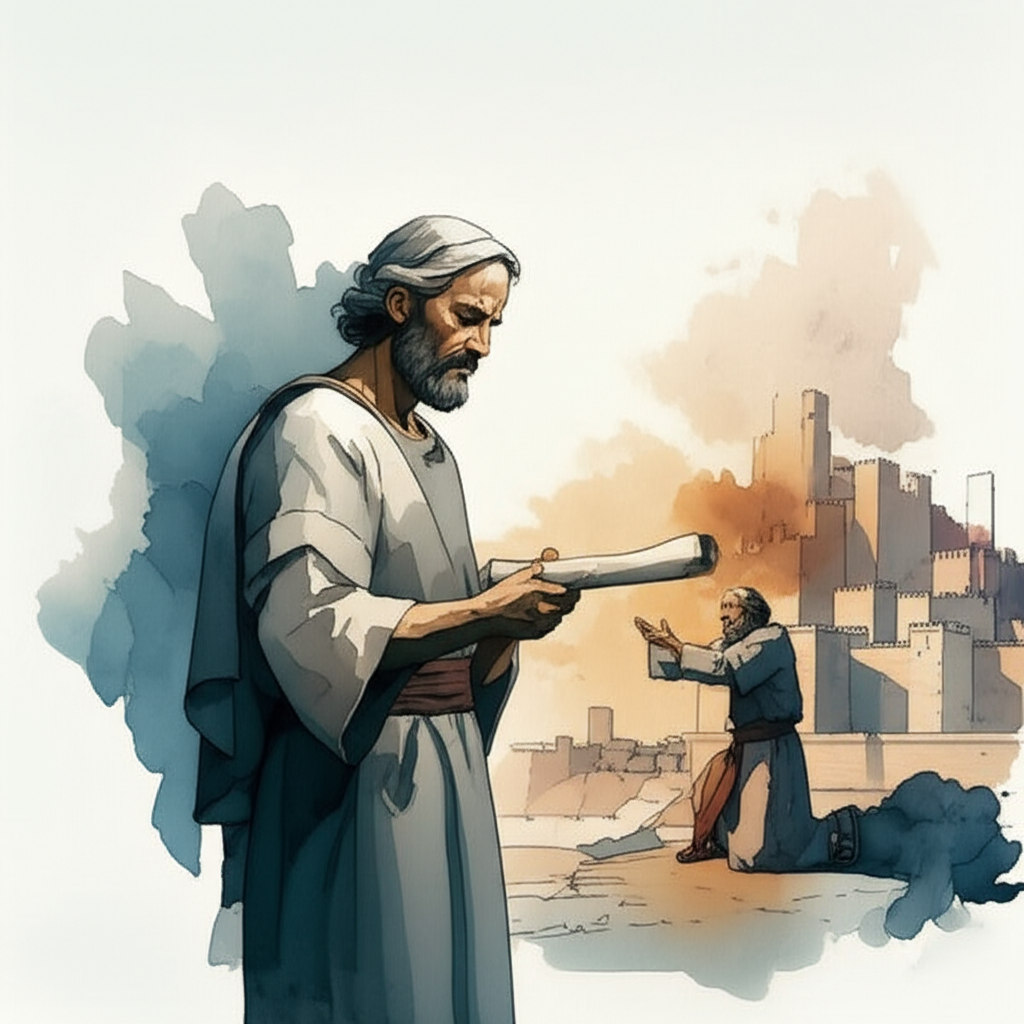

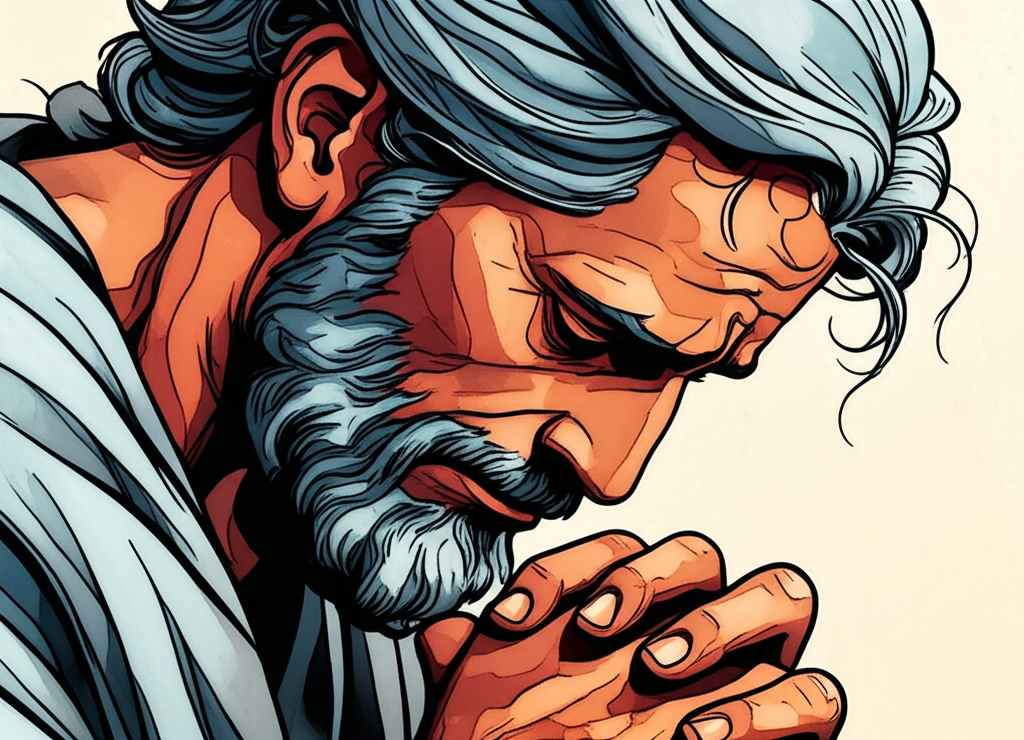
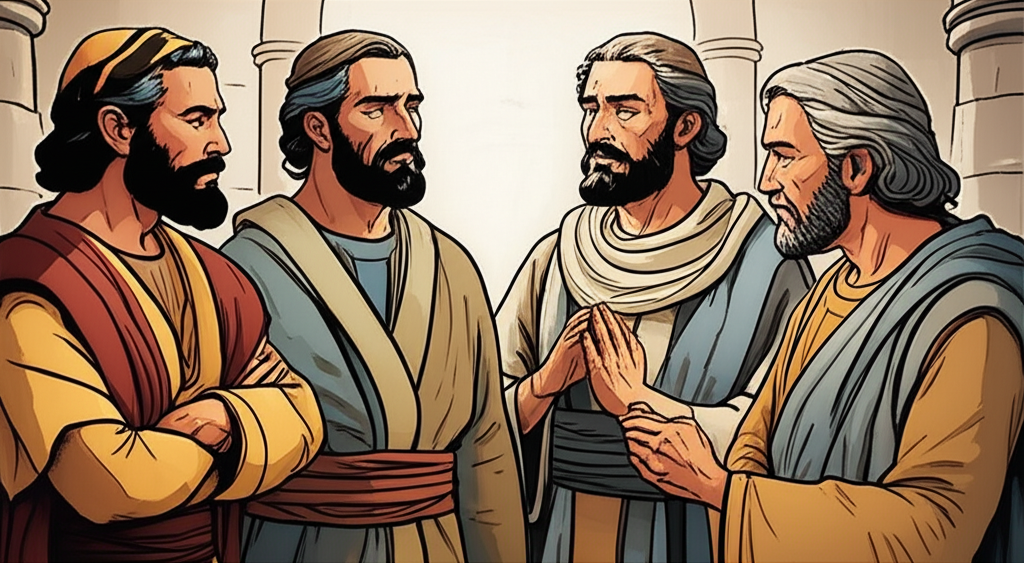
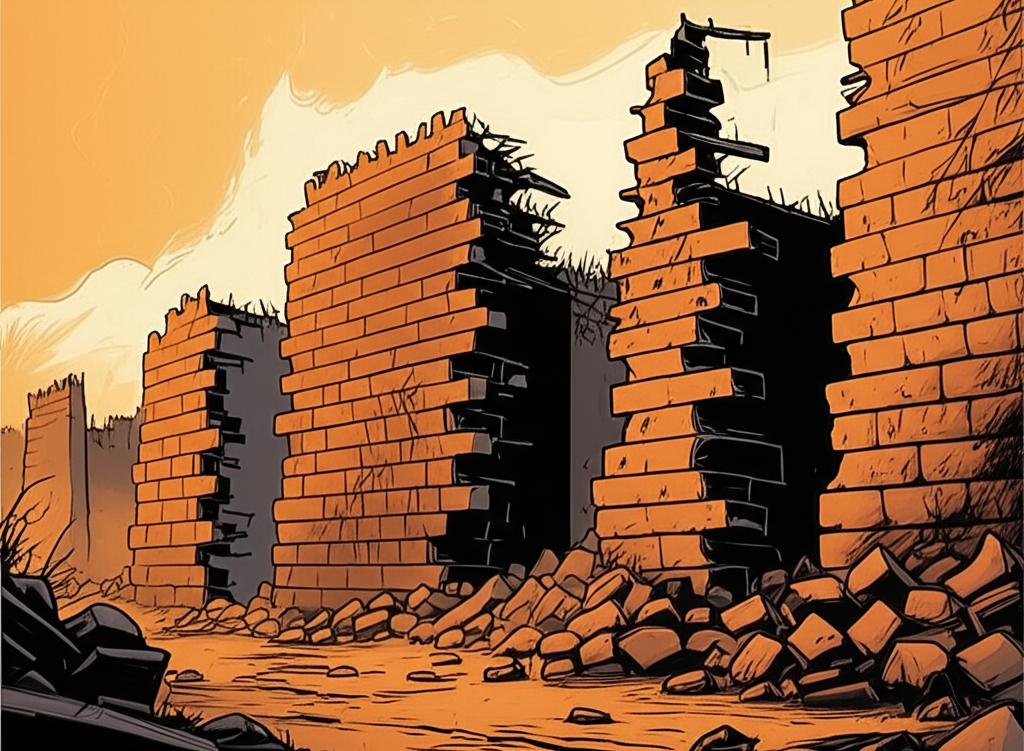

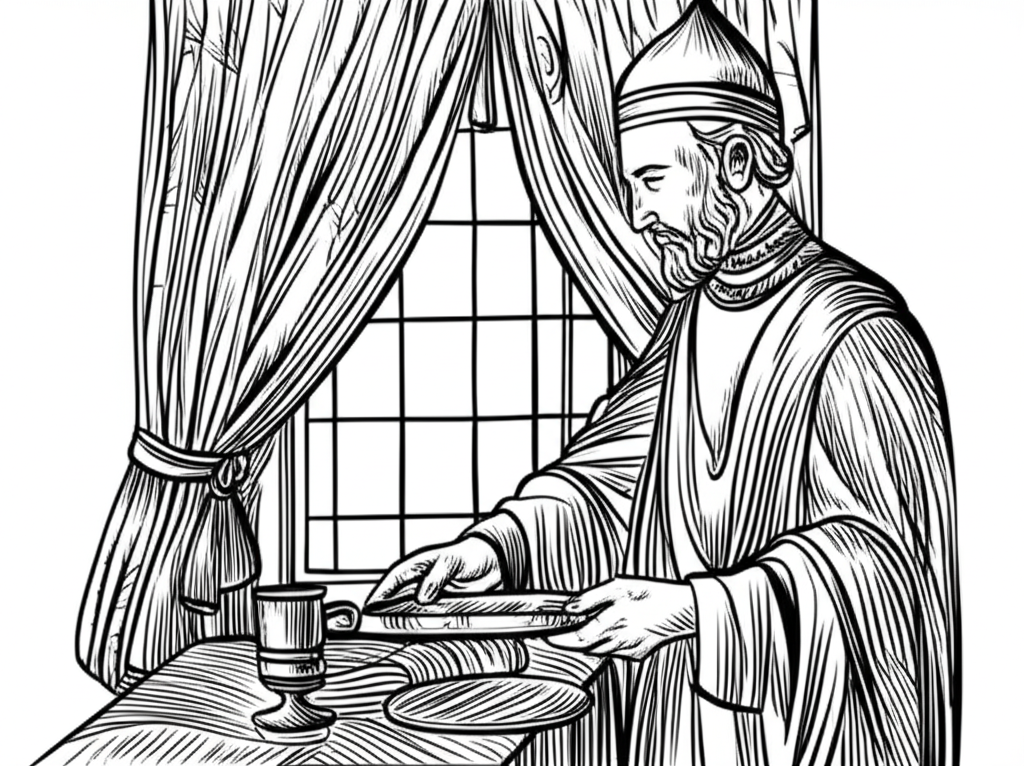


Nehemiah chapter 1 kjv
- 1 The words of Nehemiah the son of Hachaliah. And it came to pass in the month Chisleu, in the twentieth year, as I was in Shushan the palace,
- 2 That Hanani, one of my brethren, came, he and certain men of Judah; and I asked them concerning the Jews that had escaped, which were left of the captivity, and concerning Jerusalem.
- 3 And they said unto me, The remnant that are left of the captivity there in the province are in great affliction and reproach: the wall of Jerusalem also is broken down, and the gates thereof are burned with fire.
- 4 And it came to pass, when I heard these words, that I sat down and wept, and mourned certain days, and fasted, and prayed before the God of heaven,
- 5 And said, I beseech thee, O LORD God of heaven, the great and terrible God, that keepeth covenant and mercy for them that love him and observe his commandments:
- 6 Let thine ear now be attentive, and thine eyes open, that thou mayest hear the prayer of thy servant, which I pray before thee now, day and night, for the children of Israel thy servants, and confess the sins of the children of Israel, which we have sinned against thee: both I and my father's house have sinned.
- 7 We have dealt very corruptly against thee, and have not kept the commandments, nor the statutes, nor the judgments, which thou commandedst thy servant Moses.
- 8 Remember, I beseech thee, the word that thou commandedst thy servant Moses, saying, If ye transgress, I will scatter you abroad among the nations:
- 9 But if ye turn unto me, and keep my commandments, and do them; though there were of you cast out unto the uttermost part of the heaven, yet will I gather them from thence, and will bring them unto the place that I have chosen to set my name there.
- 10 Now these are thy servants and thy people, whom thou hast redeemed by thy great power, and by thy strong hand.
- 11 O LORD, I beseech thee, let now thine ear be attentive to the prayer of thy servant, and to the prayer of thy servants, who desire to fear thy name: and prosper, I pray thee, thy servant this day, and grant him mercy in the sight of this man. For I was the king's cupbearer.
Nehemiah chapter 1 nkjv
- 1 The words of Nehemiah the son of Hachaliah. It came to pass in the month of Chislev, in the twentieth year, as I was in Shushan the citadel,
- 2 that Hanani one of my brethren came with men from Judah; and I asked them concerning the Jews who had escaped, who had survived the captivity, and concerning Jerusalem.
- 3 And they said to me, "The survivors who are left from the captivity in the province are there in great distress and reproach. The wall of Jerusalem is also broken down, and its gates are burned with fire."
- 4 So it was, when I heard these words, that I sat down and wept, and mourned for many days; I was fasting and praying before the God of heaven.
- 5 And I said: "I pray, LORD God of heaven, O great and awesome God, You who keep Your covenant and mercy with those who love You and observe Your commandments,
- 6 please let Your ear be attentive and Your eyes open, that You may hear the prayer of Your servant which I pray before You now, day and night, for the children of Israel Your servants, and confess the sins of the children of Israel which we have sinned against You. Both my father's house and I have sinned.
- 7 We have acted very corruptly against You, and have not kept the commandments, the statutes, nor the ordinances which You commanded Your servant Moses.
- 8 Remember, I pray, the word that You commanded Your servant Moses, saying, 'If you are unfaithful, I will scatter you among the nations;
- 9 but if you return to Me, and keep My commandments and do them, though some of you were cast out to the farthest part of the heavens, yet I will gather them from there, and bring them to the place which I have chosen as a dwelling for My name.'
- 10 Now these are Your servants and Your people, whom You have redeemed by Your great power, and by Your strong hand.
- 11 O Lord, I pray, please let Your ear be attentive to the prayer of Your servant, and to the prayer of Your servants who desire to fear Your name; and let Your servant prosper this day, I pray, and grant him mercy in the sight of this man." For I was the king's cupbearer.
Nehemiah chapter 1 niv
- 1 The words of Nehemiah son of Hakaliah: In the month of Kislev in the twentieth year, while I was in the citadel of Susa,
- 2 Hanani, one of my brothers, came from Judah with some other men, and I questioned them about the Jewish remnant that had survived the exile, and also about Jerusalem.
- 3 They said to me, "Those who survived the exile and are back in the province are in great trouble and disgrace. The wall of Jerusalem is broken down, and its gates have been burned with fire."
- 4 When I heard these things, I sat down and wept. For some days I mourned and fasted and prayed before the God of heaven.
- 5 Then I said: "LORD, the God of heaven, the great and awesome God, who keeps his covenant of love with those who love him and keep his commandments,
- 6 let your ear be attentive and your eyes open to hear the prayer your servant is praying before you day and night for your servants, the people of Israel. I confess the sins we Israelites, including myself and my father's family, have committed against you.
- 7 We have acted very wickedly toward you. We have not obeyed the commands, decrees and laws you gave your servant Moses.
- 8 "Remember the instruction you gave your servant Moses, saying, 'If you are unfaithful, I will scatter you among the nations,
- 9 but if you return to me and obey my commands, then even if your exiled people are at the farthest horizon, I will gather them from there and bring them to the place I have chosen as a dwelling for my Name.'
- 10 "They are your servants and your people, whom you redeemed by your great strength and your mighty hand.
- 11 Lord, let your ear be attentive to the prayer of this your servant and to the prayer of your servants who delight in revering your name. Give your servant success today by granting him favor in the presence of this man." I was cupbearer to the king.
Nehemiah chapter 1 esv
- 1 The words of Nehemiah the son of Hacaliah. Now it happened in the month of Chislev, in the twentieth year, as I was in Susa the citadel,
- 2 that Hanani, one of my brothers, came with certain men from Judah. And I asked them concerning the Jews who escaped, who had survived the exile, and concerning Jerusalem.
- 3 And they said to me, "The remnant there in the province who had survived the exile is in great trouble and shame. The wall of Jerusalem is broken down, and its gates are destroyed by fire."
- 4 As soon as I heard these words I sat down and wept and mourned for days, and I continued fasting and praying before the God of heaven.
- 5 And I said, "O LORD God of heaven, the great and awesome God who keeps covenant and steadfast love with those who love him and keep his commandments,
- 6 let your ear be attentive and your eyes open, to hear the prayer of your servant that I now pray before you day and night for the people of Israel your servants, confessing the sins of the people of Israel, which we have sinned against you. Even I and my father's house have sinned.
- 7 We have acted very corruptly against you and have not kept the commandments, the statutes, and the rules that you commanded your servant Moses.
- 8 Remember the word that you commanded your servant Moses, saying, 'If you are unfaithful, I will scatter you among the peoples,
- 9 but if you return to me and keep my commandments and do them, though your outcasts are in the uttermost parts of heaven, from there I will gather them and bring them to the place that I have chosen, to make my name dwell there.'
- 10 They are your servants and your people, whom you have redeemed by your great power and by your strong hand.
- 11 O Lord, let your ear be attentive to the prayer of your servant, and to the prayer of your servants who delight to fear your name, and give success to your servant today, and grant him mercy in the sight of this man." Now I was cupbearer to the king.
Nehemiah chapter 1 nlt
- 1 These are the memoirs of Nehemiah son of Hacaliah. Nehemiah's Concern for Jerusalem In late autumn, in the month of Kislev, in the twentieth year of King Artaxerxes' reign, I was at the fortress of Susa.
- 2 Hanani, one of my brothers, came to visit me with some other men who had just arrived from Judah. I asked them about the Jews who had returned there from captivity and about how things were going in Jerusalem.
- 3 They said to me, "Things are not going well for those who returned to the province of Judah. They are in great trouble and disgrace. The wall of Jerusalem has been torn down, and the gates have been destroyed by fire."
- 4 When I heard this, I sat down and wept. In fact, for days I mourned, fasted, and prayed to the God of heaven.
- 5 Then I said, "O LORD, God of heaven, the great and awesome God who keeps his covenant of unfailing love with those who love him and obey his commands,
- 6 listen to my prayer! Look down and see me praying night and day for your people Israel. I confess that we have sinned against you. Yes, even my own family and I have sinned!
- 7 We have sinned terribly by not obeying the commands, decrees, and regulations that you gave us through your servant Moses.
- 8 "Please remember what you told your servant Moses: 'If you are unfaithful to me, I will scatter you among the nations.
- 9 But if you return to me and obey my commands and live by them, then even if you are exiled to the ends of the earth, I will bring you back to the place I have chosen for my name to be honored.'
- 10 "The people you rescued by your great power and strong hand are your servants.
- 11 O Lord, please hear my prayer! Listen to the prayers of those of us who delight in honoring you. Please grant me success today by making the king favorable to me. Put it into his heart to be kind to me."
In those days I was the king's cup-bearer.
- Bible Book of Nehemiah
- 1 Report from Jerusalem
- 2 Nehemiah Sent to Judah
- 3 Rebuilding the Wall
- 4 Opposition to the Work
- 5 Nehemiah Stops Oppression of the Poor
- 6 Conspiracy Against Nehemiah
- 7 Lists of Returned Exiles
- 8 Ezra Reads the Law
- 9 The People of Israel Confess Their Sin
- 10 The People Who Sealed the Covenant
- 11 The Leaders in Jerusalem
- 12 Priests and Levites
- 13 Nehemiah's Final Reforms